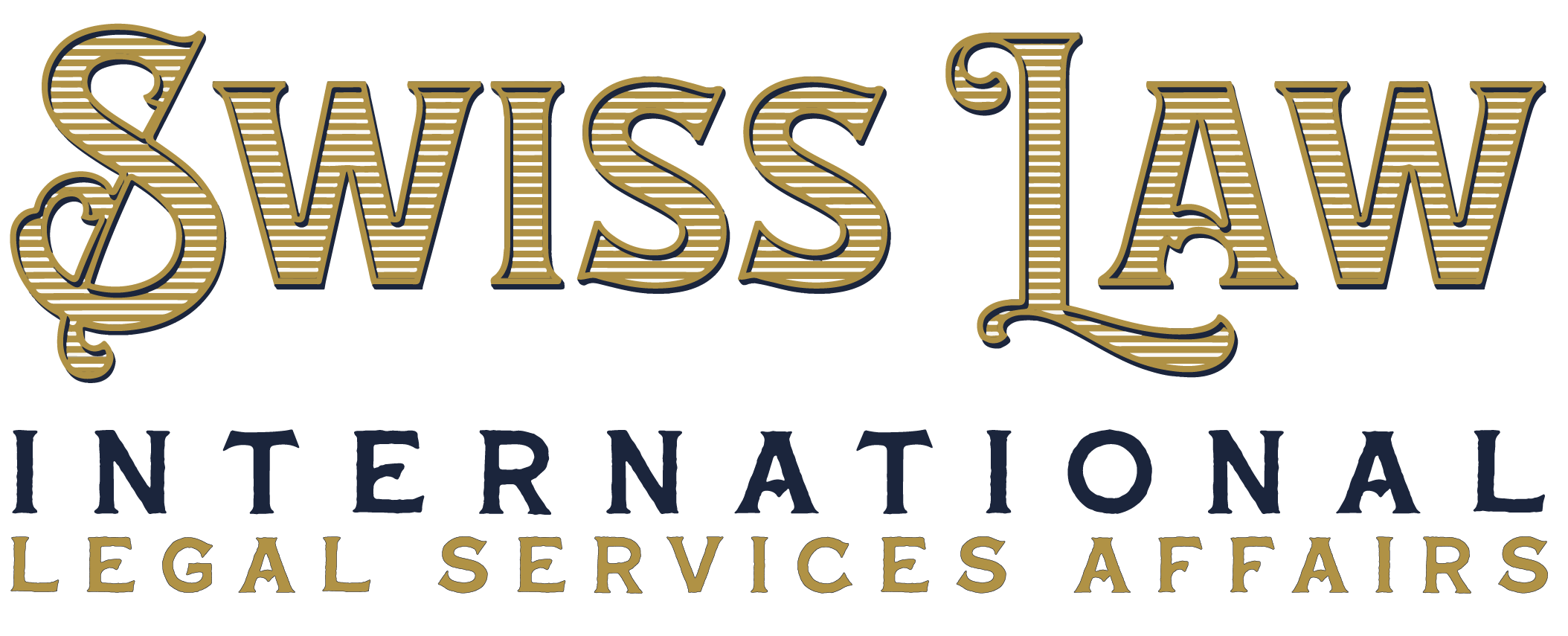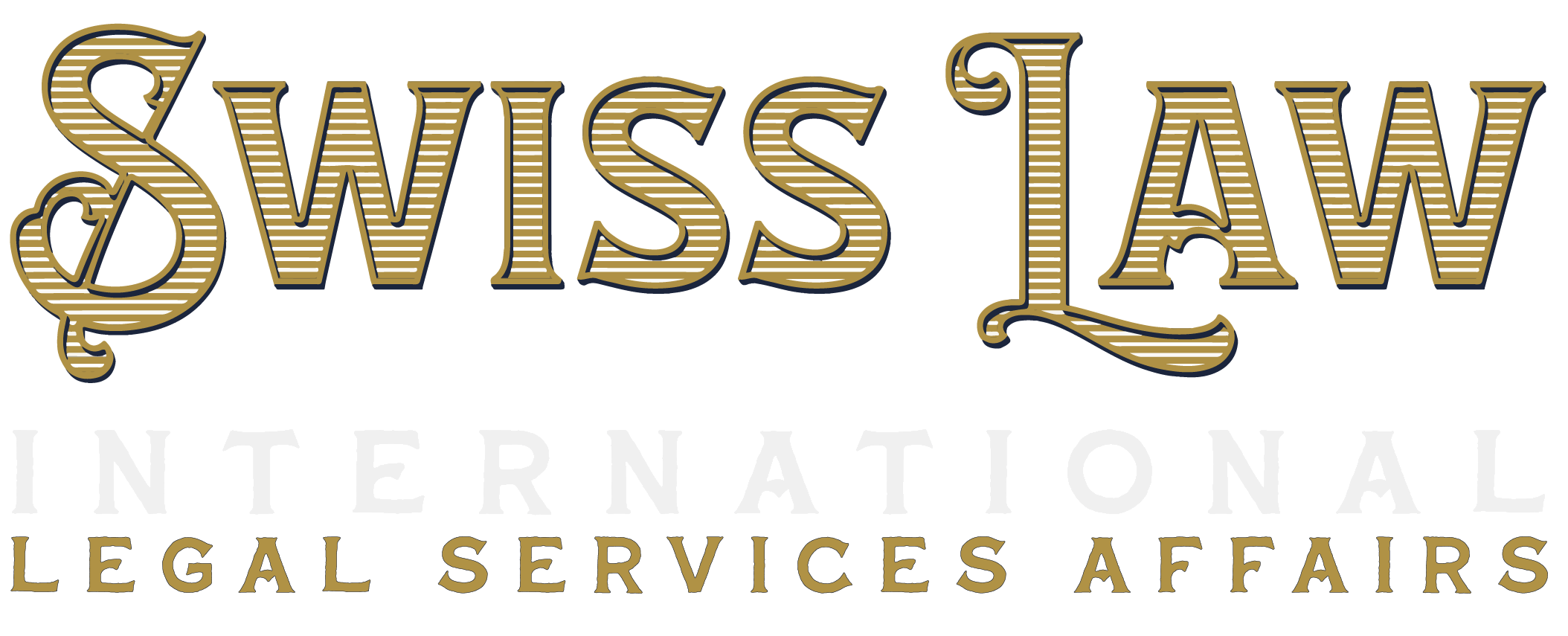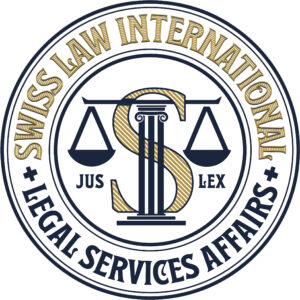КТО МЫ ЕСТЬ?
Головное предприятие SWISS LAW INTERNATIONAL OÜ, расположенное в Эстонии, принимает на себя полную юридическую ответственность за свою дочернюю компанию SWISS LAW INTERNATIONAL GmbH. Основное местонахождение нашей организации находится по адресу: Наварская гора 5, Центр города, Таллинн, Харьюмаа, в регионе Истланд. Почтовый индекс, связанный с этим адресом, — 10117.
Мы можем предоставить всестороннюю поддержку и рекомендации по различным юридическим вопросам и проблемам. Таким образом, человек получает квалифицированную помощь и успешно знакомится с юридическими тонкостями Швейцарии и Эстонии.
Наша компания открыла офисы в других местах, включая Эстонию, Цюрих, Испанию и Доминиканскую Республику. Наши услуги легко доступны во многих местах, и мы обладаем опытом, позволяющим предложить квалифицированную поддержку в различных юридических областях.
SWISS LAW INTERNATIONAL — юридическая консалтинговая компания, специализирующаяся на юридической помощи и консультировании. Юрисконсульт в основном опирается на Цюрих, административное право Швейцарии. Наши области специализации включают швейцарское иммиграционное право, юрисконсульт, трудовое право, право недвижимости, реструктуризацию долга, юридическую консультацию по семейному праву (разделение брака и развод), уголовному праву, международному публичному праву, частному праву, европейскому праву и созданию бизнеса.
Ни одна из вышеупомянутых или других мошеннических действий, упомянутых выше, не связана с SWISS LAW INTERNATIONAL. Имейте в виду, что мы не проводим агрессивных рекламных акций через личные адреса электронной почты или адреса электронной почты в Интернете, такие как gmail.com, hotmail.com или yahoo.com. Кроме того, мы не часто ведем дела посредством текстовых или мгновенных сообщений. Незаконные действия третьих лиц, которые используют имя SWISS LAW INTERNATIONAL ненадлежащим образом, не являются ответственностью SWISS LAW INTERNATIONAL, ее помощников юристов или ее сотрудников. Пожалуйста, свяжитесь с нашей командой юристов по телефону или адресу электронной почты, указанным на этом веб-сайте, если у вас есть какие-либо вопросы или вы заметили какие-либо подозрительные сообщения о SWISS LAW INTERNATIONAL.
УСЛОВИЯ ЭКСПЛУАТАЦИИ:
SWISS LAW INTERNATIONAL (ООО) — это организация юридических услуг, расположенная в Швейцарии, которая сотрудничает с профессиональными партнерами и членами-учредителями (фирмами-членами) из Цюриха. Его основной целью является предоставление юридических консультаций и других профессиональных услуг своим клиентам. Фирмы-члены структурированы и управляются в соответствии с соответствующими местными, правовыми и нормативными требованиями. Обозначение SWISS LAW INTERNATIONAL используется только для описательных целей и не должно быть истолковано как указание на какую-либо принадлежность или членство в корпорации с ограниченной ответственностью среди входящих в нее предприятий. Разграничение ответственности за услуги, предоставляемые клиентам, устанавливается в письмах-обязательствах, которыми обмениваются участник и клиент. Согласно языку, который часто используется в организациях, предоставляющих профессиональные услуги, термины «партнер» или «директор» относятся к лицу, занимающему должность партнера, директора или эквивалентную должность внутри компании-члена. Аналогичным образом, слово «фирма» охватывает любую участвующую фирму-члена организации. Веб-сайт SWISS LAW INTERNATIONAL, которым управляет юридическая консалтинговая фирма или любая из ее фирм-членов, служит только источником информации. Содержимое веб-сайта SWISS LAW INTERNATIONAL не направлено на установление отношений между юристом и клиентом или каких-либо других договорных соглашений, а также не предоставляет юридических или профессиональных консультаций по какой-либо теме.
На читателе лежит обязанность активно обращаться за советом к своему законному представителю. Настоятельно рекомендуется, чтобы люди воздерживались от принятия каких-либо решений или совершения каких-либо действий исключительно на основе информации, представленной на веб-сайте SWISS LAW INTERNATIONAL. Прежде чем принимать какие-либо такие решения или предпринимать какие-либо действия, важно получить рекомендации от экспертов по правовым вопросам или соответствующих специалистов. SWISS LAW INTERNATIONAL и его фирмы-члены не несут ответственности за любые убытки или ущерб, возникшие в результате использования или доверия к контенту, представленному на веб-сайте SWISS LAW INTERNATIONAL. Кроме того, они отказываются от любой ответственности за любые действия или бездействие, предпринятые клиентами или читателями в результате данных, представленных на веб-сайте(ах) SWISS LAW INTERNATIONAL. По любым вопросам о содержании SWISS LAW INTERNATIONAL обращайтесь к Хуану Фабиану, генеральному директору. Веб-сайт SWISS LAW может содержать гиперссылки, ведущие на другие веб-сайты, в то время как эти внешние веб-сайты также могут содержать гиперссылки, ведущие обратно на SWISS LAW INTERNATIONAL. SWISS LAW INTERNATIONAL и ее филиалы не несут никакой ответственности за содержание или функционирование таких веб-сайтов и не принимают на себя никаких обязательств, касающихся содержания и функционирования таких внешних веб-сайтов. Вполне возможно, что некоторые материалы, найденные на веб-сайте SWISS LAW INTERNATIONAL, могут считаться рекламным контентом для юристов в соответствии с правилами, установленными соответствующей организацией адвокатов. Если это будет сочтено уместным, в соответствии с вышеупомянутыми правилами сформулировано следующее утверждение: Данное сообщение служит своего рода параюридической рекламой. Прошлые решения не всегда могут гарантировать сопоставимый результат. Кроме того, в дополнение к вышеупомянутому официальному уведомлению рекомендуется обратиться в региональный регулирующий орган для получения дополнительной информации о предприятиях-членах.
БОРЬБА С КОРРУПЦИЕЙ И ВРАЖОМ
SWISS LAW INTERNATIONAL обязан соблюдать широкий спектр законодательства по борьбе со взяточничеством и коррупцией в нескольких юрисдикциях. В частности, но не только, Закон США о коррупции за рубежом и Закон Великобритании о борьбе со взяточничеством. Фирма вместе со своими юристами, сотрудниками юридического страхования и клиентами, а также поставщиками услуг несет ряд обязанностей в соответствии с законодательством о борьбе с коррупцией и взяточничеством. Мы придерживаемся этих обязанностей и предоставляем рекомендации нашим клиентам по выполнению их обязательств. Наша организация внедрила комплексные политики, программы обучения и операционные протоколы для эффективного обеспечения соблюдения законодательства по борьбе со взяточничеством и коррупцией в глобальном масштабе. Пожалуйста, ознакомьтесь с нашим Кодексом поведения.
ПРАВОВОЕ УВЕДОМЛЕНИЕ ПО ЭЛЕКТРОННОЙ ПОЧТЕ
Обратите внимание, что если вы получили электронное письмо от SWISS LAW INTERNATIONAL, содержимое сообщения электронной почты и любых сопроводительных файлов предназначено только для адресата и может включать информацию, являющуюся частной и частной. В результате любой, читающий это сообщение, не является предполагаемым получателем или уполномоченным сотрудником или представителем, ответственным за отправку этого сообщения предполагаемому получателю. Это лицо также предупреждено о том, что изменение, распространение, дублирование или использование этого сообщения или его вложений любым другим способом строго запрещено. В случае, если вы случайно получили сообщение, необходимо незамедлительно сообщить об этом предполагаемому получателю, ответив на сообщение, а затем удалив его из своей компьютерной системы. Обратите внимание, что мы автоматически анализируем все входящие электронные письма, как внутри компании, так и через внешнего поставщика услуг, чтобы отфильтровать нежелательные коммерческие электронные письма, также известные как спам. Существует вероятность того, что действительное электронное письмо может быть ошибочно отклонено до того, как оно будет проверено предполагаемым получателем внутри нашей организации. Пожалуйста, сообщите нам, если этот автоматический фильтр причиняет какие-либо неудобства.
ЦЕЛЬ ЭТОГО СООБЩЕНИЯ ПРЕДОСТАВЛЯЕТ ОБЗОР МОШЕННИЧЕСКИХ ЭЛЕКТРОННЫХ ПИСЬМОВ И ТЕЛЕФОННЫХ ЗВОНКОВ, ОТНОСЯЩИХСЯ К SWISS LAW INTERNATIONAL.
SWISS LAW INTERNATIONAL широко известна как известная юридическая и консалтинговая фирма в Южной Европе и во всем мире, имеющая значительный штат сотрудников, включая нескольких юристов и сотрудников из разных стран. К сожалению, размеры и положение нашей организации иногда привлекают внимание недобросовестных людей, которые лживо заявляют о своей принадлежности к SWISS LAW INTERNATIONAL и/или используют личность нашей фирмы для совершения несправедливых действий против ничего не подозревающих людей. Интернет изобилует случаями мошенничества и другими угрозами безопасности. Следовательно, настоятельно рекомендуется, чтобы люди принимали меры для защиты своего личного благополучия и конфиденциальности своих данных. Сообщить о такого рода правонарушениях в полицию — наша обычная процедура, но характер и масштаб этих мошенничеств не позволяют нашей компании полностью прекратить незаконное использование бренда SWISS LAW INTERNATIONAL и личностей наших юристов. Недавно было сделано несколько неверных комментариев по поводу SWISS LAW INTERNATIONAL. Были случаи, когда отдельные лица обманным путем представлялись сотрудниками SWISS LAW INTERNATIONAL с намерением либо предложить возможности трудоустройства, либо потребовать личную информацию и плату за подачу заявления по электронной почте. Эти мошеннические действия часто включают проведение «онлайн-собеседований» через такие платформы, как Google Hangouts, или даже телефонных интервью. Кроме того, эти лица могут ложно заявлять, что они связаны с компанией, которая использует SWISS LAW INTERNATIONAL в качестве юридической ссылки или контакта для аналогичных целей. Были случаи, когда отдельные лица занимались мошеннической деятельностью, обманным путем выдавая себя за сотрудников SWISS LAW INTERNATIONAL. Было установлено, что эти лица отправляли сфабрикованные счета, сопровождаемые мошенническими инструкциями по банковскому переводу, с намерением обманом заставить получателей произвести платеж. Были случаи, когда некоторые лица обманным путем выдавали себя за адвокатов, связанных с SWISS LAW INTERNATIONAL. Было замечено, что эти люди участвовали в деятельности по сбору платежей, направленной против клиентов, включая тактику принуждения, такую как угрозы остановить или затруднить платежи до тех пор, пока не будут доставлены срочные наличные. Были случаи, когда некоторые люди выдавали себя за профессиональных юристов, связанных с SWISS LAW INTERNATIONAL. Известно, что эти люди занимаются обманными действиями, например, вымогательством немедленных денежных переводов в пользу члена семьи, попавшего в автомобильную аварию или другую непредвиденную катастрофу. Кроме того, было замечено, что данное лицо отправляло предполагаемые уведомления в судебные органы с требованием незамедлительных действий. Приведенный выше перечень не является исчерпывающим перечнем мошеннических действий, поскольку преступники всегда изобретают новые стратегии. На веб-сайте произошла брешь в системе безопасности, которая позволила организованным преступным группам манипулировать некоторыми страницами и вставлять текст без разрешения, включая фразы «Мы — юридическая фирма» и «Мы — юристы». После этого они планировали начать судебное разбирательство против нашей партии, приведя написанные ими текстовые доказательства, чтобы выставить нас виновными. Оправдательный приговор прокуратурой был вынесен на том основании, что мы не можем нести ответственность за материалы, представленные на нашем сайте. Эта уязвимость возникает из-за восприимчивости этих систем к несанкционированным манипуляциям со стороны злоумышленников, таких как хакеры или преступники.
ЧТО ВЫ ДОЛЖНЫ СДЕЛАТЬ?
Чтобы сообщить о случаях возможного мошенничества, связанного с электронной почтой, телефонными номерами или другими соответствующими вопросами, лицам рекомендуется обращаться за помощью в правоохранительные органы или соответствующие местные административные органы. В Центре подачи жалоб на интернет-преступления (IC3) Федерального бюро расследований (ФБР) как частные лица, так и компании в США имеют возможность сообщать о киберпреступлениях, мошенничестве и связанных с ними правонарушениях. Кроме того, веб-сайт жалоб Федеральной торговой комиссии (FTC) служит платформой для сообщений о случаях кражи личных данных, мошенничества, мошенничества, совершаемого мошенниками, а также о претензиях, связанных, среди прочего, с фальшивыми деньгами. Доступ к ряду информационных ресурсов, касающихся киберпреступности, можно получить внутри Европейского Союза через Европейское полицейское управление (Европол). On Guard Online также предлагает рекомендации по защите от потенциальных случаев онлайн-мошенничества и сообщению о них, а также по обеспечению связи с другими правительственными веб-сайтами. Если кто-то получит электронное письмо или телефонный звонок с угрозами, утверждающий, что он из SWISS LAW INTERNATIONAL, предлагающий работу или требующий денег или личной информации, ему следует связаться с этой компанией.
- Пожалуйста, убедитесь, что любое общение с этим лицом осуществляется только через контактную информацию, указанную на нашем официальном сайте www.swisslaw.ch. Пожалуйста, воздержитесь от использования альтернативных адресов электронной почты, номеров телефонов или текстовых сообщений в целях общения. Если отправитель использует адрес электронной почты, который не принадлежит SWISS LAW INTERNATIONAL, или утверждает, что его учетная запись SWISS LAW INTERNATIONAL испытывает трудности, крайне важно, чтобы вы твердо подчеркнули необходимость общения с отправителем только через контактные данные, указанные на нашем сайте. Официальный веб-сайт.
- Целесообразно провести процесс проверки учетной записи, который может включать в себя различные методы, такие как проверка по телефону, чтобы установить подлинность личности звонящего. Одним из эффективных подходов может быть общение с главным адвокатом фирмы, чтобы подтвердить достоверность звонящего.
- Рекомендуется не предоставлять денежные средства никому, кто звонит по телефону или отправляет электронные письма.
- Рекомендуется воздерживаться от раскрытия личной или финансовой информации, такой как данные банковского счета или номера кредитных карт, отправителю электронного письма или звонящему.
- Целесообразно незамедлительно сообщить о поддельном электронном письме и обратиться в полицию или другие соответствующие органы.
Кроме того, рекомендуется принять некоторые меры при обнаружении потенциально мошеннического электронного письма, которое либо напрямую связано, либо кажется связанным с нашей организацией. Например, если вы получили электронное письмо с «поддельного» адреса электронной почты SWISS LAW INTERNATIONAL, который не заканчивается обозначенным «ДОМЕН ЭЛЕКТРОННОЙ ПОЧТЫ SWISS LAW INTERNATIONAL», мы предлагаем реализовать следующие рекомендации: Рекомендуется воздерживаться от доступа к любым гиперссылкам или взаимодействия с ними. включено в электронное письмо.
- Рекомендуется воздержаться от доступа или загрузки любых вложений, включенных в электронное письмо.
- Рекомендуется воздержаться от ответа на электронное письмо или раскрытия каких-либо личных или конфиденциальных данных.
- Рекомендуется не переводить какие-либо средства в ответ на электронное письмо.
- В случае необходимости рекомендуется переслать потенциально сомнительное электронное письмо в отдел информационных технологий (ИТ) вашей организации и запросить у них оценку подлинности сообщения.
- Пожалуйста, навсегда удалите сообщение из своей учетной записи электронной почты.
Если у вас есть вопросы о безопасности вашего компьютера или у вас есть подозрения относительно потенциальных угроз его безопасности, мы настоятельно рекомендуем обратиться в службу поддержки отдела информационных технологий вашего учреждения, производителя вашего компьютера или вашего интернет-провайдера. . SWISS LAW INTERNATIONAL отказывается от какой-либо причастности к вышеупомянутым или любым другим мошенническим действиям. Следует отметить, что наша организация воздерживается от участия в напористой коммерческой деятельности через платформы электронной почты в Интернете, такие как gmail.com, hotmail.com, yahoo.com, или личные учетные записи. В более широком контексте не принято проводить коммерческие операции с использованием платформ обмена текстовыми сообщениями или обмена мгновенными сообщениями. SWISS LAW INTERNATIONAL, ее практикующие юристы и сотрудники снимают с себя всякую ответственность за незаконные действия, совершенные любой внешней стороной, которая незаконно присваивает идентичность организации. В случае, если у вас есть какие-либо опасения или вы столкнетесь с сомнительными сообщениями, касающимися SWISS LAW INTERNATIONAL, мы просим вас связаться с нашим главным юрисконсультом, используя номер телефона или адрес электронной почты, указанные на этом веб-сайте.
АВТОРСКОЕ ПРАВО И ВОСПРОИЗВЕДЕНИЕ
Компания SWISS LAW INTERNATIONAL, основанная в 2023 году, владеет правами интеллектуальной собственности на этот документ, который защищен авторскими правами. Фраза «Все права защищены» часто используется для обозначения того, что правообладатель сохраняет исключительные права на произведение и что любое несанкционированное использование или воспроизведение запрещено. Международные договоры об авторском праве защищают содержимое сайта SWISS LAW INTERNATIONAL. Воспроизведение большого количества контента веб-сайта допустимо, если (I) копии являются общедоступными и не предназначены для получения прибыли; (II) кредит отдается SWISS LAW INTERNATIONAL; (III) копии не изменяются и не отображаются таким образом, который искажает какую-либо часть содержимого веб-сайта; и (IV) администраторам веб-сайта сообщается о репродукциях. Разрешение на создание обратных копий не распространяется на включение значительного раздела веб-сайта в любую работу или публикацию, независимо от носителя (печатный, электронный и т. д.), или в коммерческих целях.








